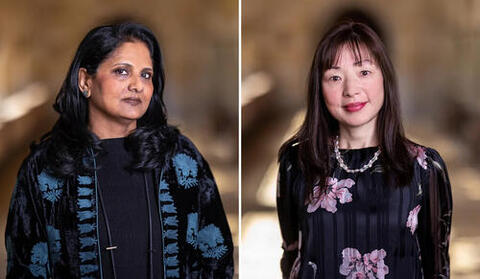Time’s ‘100 Most Influential’ list features a pair of Yale professors

Akiko Iwasaki and Priyamvada Natarajan are part of 2024’s Time 100, a list that includes leaders of government, the arts, athletics, science, and industry.
Two Yale faculty members — a trailblazing astrophysicist and a leading immunologist — are part of Time Magazine’s 2024 list of the 100 most influential people in the world.
Priyamvada Natarajan, whose theories on the unseen forces underpinning the universe are being explored by powerful new space telescopes, and Akiko Iwasaki, whose work on the human body’s response to viral infections became essential research during the COVID-19 pandemic, each of whom joined the Yale faculty in 2000, are part of a prestigious list that recognizes “the impact, innovation and achievement of the world’s most influential individuals.”
Time editors announced this year’s list on April 17. There will be a two-day fete for the honorees later this month in New York City.
Published annually, the list includes global leaders, titans of industry, athletes, media superstars, and creative geniuses. The full list can be viewed here.
It is the first time in more than a decade that a sitting member of the Yale faculty has been named to the list — although a number of Yale alumni have been included in recent years, such as former Fed chair Janet Yellen ’71 Ph.D.; actress Angela Bassett, ’80, ’83 M.F.A.; U.S. Secretary of Commerce Gina Raimondo ’98 J.D.; novelist and essayist Chimamanda Ngozi Adichie ’08 M.A.; architect Maya Lin ’81, ’86 M. Arch.; and Evan Wolfson ’78, who founded the movement that made same-sex marriage legal in the United States. Olympic gold medalist figure skater Nathan Chen ’24, made the list two years ago.
It sends a message that people working in science can be seen as influential, and that is very gratifying.
priyamvada natarajan
Also on the 2024 list is actress Da’Vine Joy Randolph ’11 Cert.Dr., who won a Best Supporting Actress award during the recent Academy Awards for her role in “The Holdovers.”
“I’m still pretty stunned by it,” said Natarajan, the Joseph S. and Sophia S. Fruton Professor and Chair of Astronomy and professor of physics in Yale’s Faculty of Arts and Sciences (FAS). She said that when she received the email from Time editors telling her about the honor, she suspected it might be spam.
“I realize what an honor and privilege this is,” she said. “It sends a message that people working in science can be seen as influential, and that is very gratifying.”
“This was completely unexpected,” said Iwasaki, the Sterling Professor of Immunobiology and professor of dermatology at Yale School of Medicine, and of molecular, cellular, and developmental biology in FAS, professor of epidemiology at Yale School of Public Health, and investigator at the Howard Hughes Medical Institute.
“It is a recognition that influence comes at us through many different angles, be it government, the arts, or medicine,” Iwasaki said. “I’m particularly happy to be honored with Priya — she’s a role model to so many women.”
“I was delighted to learn that Priya and Akiko are receiving this well-earned honor,” said Yale President Peter Salovey. “My hope is that it will inspire students from all walks of life to follow their example in making advances in STEM that elevate our understanding of the world around us — from the function of viruses to the workings of the universe.”
It is a recognition that influence comes at us through many different angles, be it government, the arts, or medicine.
akiko iwasaki
The two honorees have contributed extensive research that has revealed new insights spanning from the inner workings of the human immune system to the farthest points in the known universe.
Iwasaki, a prolific researcher who received her Ph.D. from the University of Toronto and did her postdoctoral training at the National Institutes of Health, has made a series of discoveries about how the body’s immune system responds to viral infections.
She received global attention for her work on the immune response to COVID-19, including research that identified key immunopathological mechanisms underlying severe COVID and elucidated sex differences in the immune response to COVID. She continues to investigate characteristics of long COVID.
Being part of the Time list, Iwasaki said, may open new ways to bring awareness and funding for medical research related to viral diseases: “I’m always looking for opportunities to communicate the importance of medical research.”
Natarajan, meanwhile, has focused her work on the invisible universe — black holes and their relationship to the formation and evolution of galaxies going back to the earliest stages of the universe. Her groundbreaking theories on using gravitational lensing to study dark matter, as well as her theoretical work on the formation and growth of black holes, have been validated with multiple observational discoveries.
Her path-breaking ideas continue to guide researchers as they peer into the cosmos with more powerful telescopes.
Recipient of many awards and honors, Natarajan earned her Ph.D. from Cambridge in 1999, where she was the first woman in Astrophysics to be elected a Fellow at Trinity College, and her bachelor’s and master’s degrees from MIT.
“To be in this group with Akiko is such a privilege, and I view it as an acknowledgement of the importance of science at a time when it feels like science is somewhat under siege,” she said. “I’m also looking forward to meeting the other people on the list, who are changing the world in the own way. And to dressing up for the gala!”
Added Iwasaki, “My daughters want me to take as many photos as possible.”
Story by Jim Shelton, YaleNews
